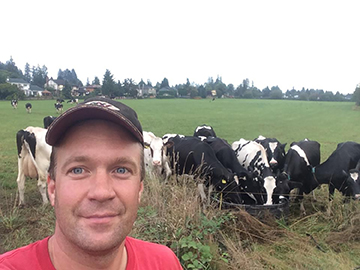DELTA—Spring ahead? Fall back? Or just skip the whole thing?
According to a provincial survey of public opinion, nearly 92% of farmers favour a proposal to put the province on Daylight Savings Time year-round.
That’s slightly less than the provincial average, which saw more than 93% of the 223,273 respondents speak out in favour of the proposed change. Just 4% of respondents were farmers, fishers, foresters or hunters.
There’s no timeline for the change, and it’s not a burning issue for Jack Bates of Tecarte Farms in Delta and chair of the BC Blueberry Council.
“It doesn’t matter to me one way or another,” he says. “It might make a difference to farming in that there’s only so many daylight hours. In the north, it might change the start of working times because it might not be light until 9:30 or later.”
People will work with the light they’ve got, says Bates, and it certainly won’t matter to the livestock.
“Let’s face it, everybody gets up in the morning and goes to work and if it’s not light until 8:30, I guess we get more light at the end of the day,” he says. “The cows don’t know the difference, but it does screw them up when you change, so as far as dairy farmers go, it may be a good thing.”
George Martins at Delmar Dairy in Chilliwack thinks doing away with seasonal time changes is a great idea.
“I love it,” he says. “It would probably make things better – an extra hour in the evening for finishing the different chores.”
He isn’t concerned about sunrise coming later at certain times of the year and says it won’t make a difference to farmers like him who get up at 4 am, anyway.
Katie Leek, manager of Emma Lea Farms in Delta, doesn’t see much of an impact one way or the other, though she admits it requires a bit of a shift with livestock when the time springs ahead or falls back. Emma Lea Farms has beef cattle as well as a few chickens and domestic farm animals.
“For our animals, shifting an hour for them is not as complicated as it would be for other livestock farmers,” she says. “I don’t really have an opinion on it; I can see both sides.”
Some dairy farmers, like Matt Laity of Brookfield Farm in Maple Ridge, think the current system should remain.
“It is a hassle, yes, but the option we’re looking at is an after-9 am sunrise in the winter,” he says. “We still live far enough north where the [difference of] summer to winter daylight is significant versus California, where the days are almost always the same.”
He explains that while the cows do need to adjust, it only takes two or three days.
“I give them the two or three days that I need to adjust myself,” he explains. “If I start too early or too late, they look at me funny.”
Bates points out that safety is an issue that’s often overlooked in the debate.
“On those dark dreary days in December and into January, it might not be light until 9:30, so it might be dark when kids are going to school. It might be a safety issue,” he says. “There’s a reason why it changed and everyone’s forgotten that.”
Nevertheless, a majority of survey respondents feel greater daylight in the evening will enhance their evening commute (53%) while 39% noted “other safety concerns” as a reason for supporting the permanent adoption of DST.


 Going solo
Going solo